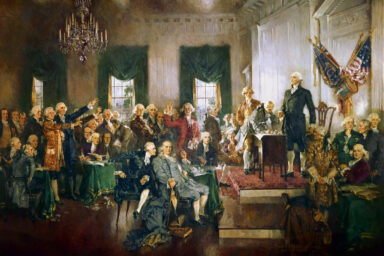They are really coming. Official investigations of the George W. Bush administration are on the way. Karl Rove and Harriet Miers have just agreed to limited testimony before the House Judiciary Committee, which is looking into the seemingly politically-motivated firings of seven U.S. Attorneys. Judiciary Committee Chairman John Conyers and Patrick Leahy, his senate counterpart, have additional potential improprieties in their sights, and they are not alone. The Senate Intelligence Committee has already declared its intent to scrutinize CIA practices related to terrorism suspects. And that’s just for starters. We may soon become accustomed to powerful figures squirming as cameras flash, being asked about everything from war to Wall Street.
Politicians will appear heroic. The media will get a hot story they won’t have to do a bit of digging for. And the rest of us? Some insight, perhaps, into the power-grabbing, lies and greed of the last eight years.
But beyond that, the historical record of official inquiries, is not, on balance, reassuring. Think of the 9/11 panel, the Iraq inquiry, the Warren Commission, the interminable and confusing Iran-Contra hearings. Only rarely does such a probe produce useful results. More often the public is benumbed by an unfathomable depth of detail and a perplexing array of claims. The best material often is withheld for one reason or another. The recommendations typically end up watered down or ignored.
Worst of all, the public gets a vague sense that the problem has been taken care of because — well, weren’t there those big hearings?
By all means there should be hearings. But for the media, commissions can too easily become a cop-out — an excuse for sitting in the audience and serving as stenographer for other peoples’ accusations. The “news” becomes what someone says, rather than whether what they say is true or not. And the criteria for newsworthiness becomes whether there are sensational revelations — which often are not accompanied by broader context.
And thus we likely would see more of the appalling journalistic performance we witnessed during the presidency of George W. Bush — the reluctance to question the official story in case after case, from weapons of mass destruction to the neutering of regulators charged with keeping an eye on bankers and brokers. (We’ve seen how well the deregulation of the financiers worked out.)
Why did the media perform so badly? Recently, budgets for inquisitive journalism have been slashed. But for years, news organizations were producing huge profits, and even then, genuine reporting — as opposed to high level stenography — got short shrift. Digging to the root cause of problems requires a commitment of time and resources that taxes the bottom line and angers the influential. There’s a natural tendency to leave it to someone else — and hope a Congressional commission comes along to fill the void.
The most frustrating thing is that we never seem to get around to asking the bigger questions about how we got into this mess in the first place. The very idea that we would even need Leahy’s proposed Truth and Reconciliation Commission for a president we elected twice is on its face absurd. It also suggests that there may be more to the story. And in fact, there is. George W. Bush and his astonishing performance cannot be understood as an isolated occurrence. In truth, he was less the bumptious rebel we cathartically laugh at in Oliver Stone’s W. and Will Ferrell’s Broadway hit than a leading man in a much grimmer, long-running saga.
It is not insignificant that someone named George Bush has been president or vice president for 20 of the last 28 years. Even before that we saw George the elder serve as UN ambassador, envoy to China, and CIA director. Prior to that, came George W.’s grandfather, investment banker and two-time senator Prescott Bush. All three generations labored assiduously to skew public policy toward the interests of America’s wealthiest people and their allies among oilmen, defense contractors, and bankers. Two of those generations’ agendas were obscured by a veneer of patrician civility. Only George W.’s transparent indifference to the harm he caused has forced us to begin peeking behind the curtain.
This pervasive enterprise has been a barely-buried dimension in our national life: the big picture that somehow never quite makes it to the front page or to TV and computer screens. It should have informed the daily reporting of the last eight years, not been consigned to a special commission process that will flit briefly across America’s collective consciousness and then be forgotten.
Official inquiries are not, in and of themselves, a bad thing. But Congressional committees, or commissions, are unlikely to produce the kind of in-depth revelations, and bracing public discussion, that we so desperately need. Getting to the bottom of what ails our democracy requires the exposure of long-hidden facts in meaningful historical context, and for this we need a new commitment to journalism that matters, that tells people the way things really are and how they got that way.


